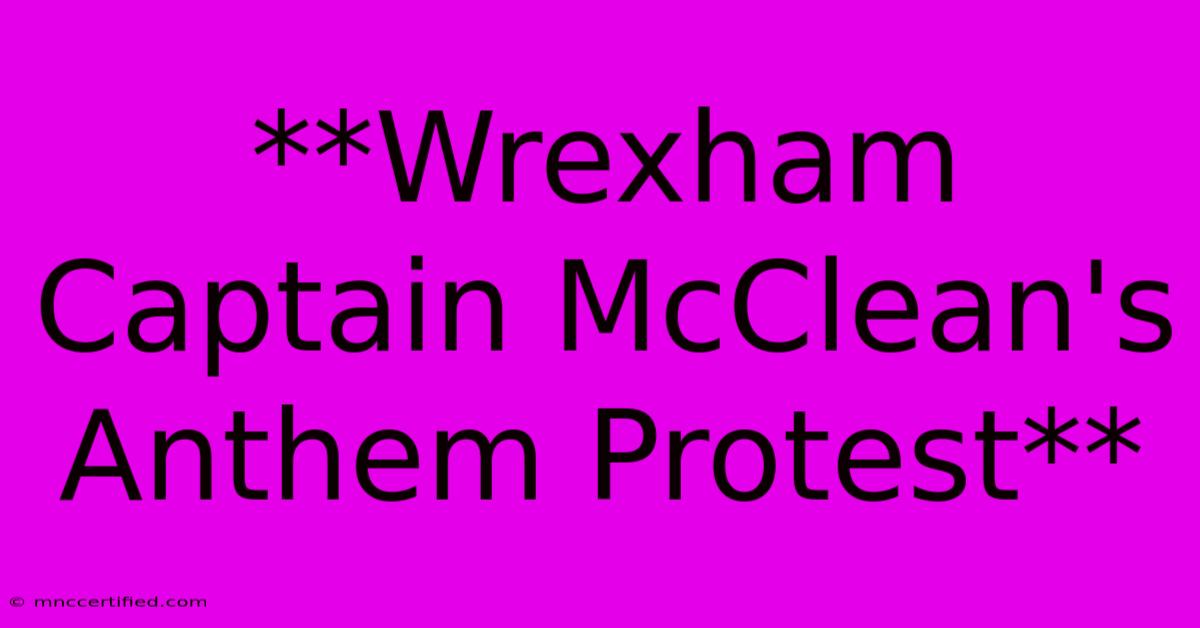**Wrexham Captain McClean's Anthem Protest**

Table of Contents
Wrexham Captain McClean's Anthem Protest: A Look at the Controversy
The recent decision by Wrexham AFC captain Paul Mullin to sing the Welsh national anthem before a match, while teammate Paul McClean opted out, sparked considerable debate. This incident brought to the forefront a long-standing issue: the complexities of national identity and the right to individual expression within the context of a shared sporting experience.
McClean's History of Anthem Protests
McClean's refusal to sing the British national anthem is not a new phenomenon. His history of protest dates back to his time playing for Sunderland in 2012. His decision stems from his Irish Republican background and a deeply held belief that the British national anthem represents a history of oppression in Ireland.
While some have criticized McClean for his actions, labeling them as disrespectful, others view it as a powerful statement of personal conviction. His supporters argue that he is simply exercising his right to express his own beliefs and cultural identity.
The Wrexham Situation
The recent controversy surrounding McClean's anthem protest in Wrexham has brought to light the challenge of balancing individual rights with team unity and the expectations of fans.
Wrexham AFC, a club with a rich history and a passionate fanbase, has become a global phenomenon thanks to its ownership by Hollywood actors Ryan Reynolds and Rob McElhenney. The club's newfound popularity has exposed them to a wider audience, and with it, a range of perspectives on this sensitive topic.
While McClean's choice to remain silent during the Welsh national anthem was met with some negative reactions, the club and its fans have largely shown support for their captain. The incident serves as a reminder that the world of football is not immune to the complexities of social and political issues.
The Larger Conversation
McClean's anthem protest is not simply about football. It raises broader questions about cultural identity, historical trauma, and the role of sports in national narratives. This ongoing dialogue highlights the importance of understanding and respecting individual perspectives, even when they differ from our own.
For McClean, the protest is a personal statement, a way to honor his heritage and challenge the dominant narrative surrounding his identity. While some may disagree with his approach, it is crucial to acknowledge the powerful emotions and convictions that drive his actions.
Ultimately, McClean's anthem protest serves as a reminder of the diverse experiences and beliefs within society. It prompts us to engage in respectful dialogue, to challenge our own assumptions, and to appreciate the complexities of national identity in a globalized world.

Thank you for visiting our website wich cover about **Wrexham Captain McClean's Anthem Protest** . We hope the information provided has been useful to you. Feel free to contact us if you have any questions or need further assistance. See you next time and dont miss to bookmark.
Featured Posts
-
Pete Wicks Dedicates Strictly Dance To Late Nan
Nov 10, 2024
-
100 Percent Investment Property Loans
Nov 10, 2024
-
Arcane Season 2 Review Animation Excellence
Nov 10, 2024
-
Arcane Season 2 Alliances Shift Trouble Brews
Nov 10, 2024
-
Nepals U 19 World Cup Bid Stumbles
Nov 10, 2024